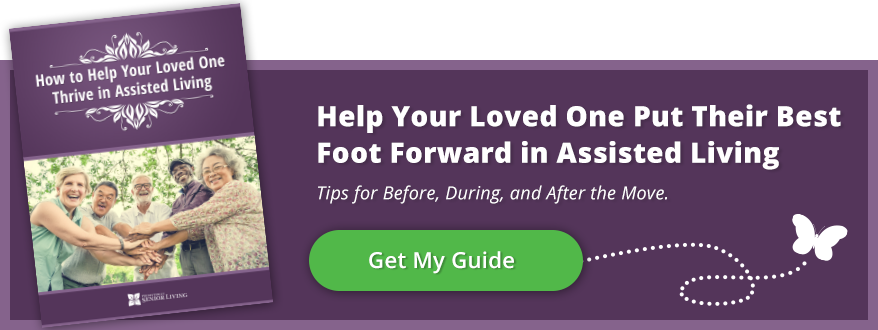
What To Do If You Think Your Parents Need Extra Care
Updated from the original publication on March 8, 2018.
Sometimes, age can surprise us. You may have noticed it in your own body; one week you’re doing fine, and the next you have some unexplained back or knee pain. Or maybe you keep forgetting where you put your keys. With seniors, these changes can come even quicker. If you don’t see your senior loved ones often, it’s possible the issues started a while ago but you didn’t notice until a recent visit. You may be wondering what you can do to help.
Signs Your Loved One Needs Extra Care
It’s often the case that your parents or loved ones won’t ask for help even if they do need it. This can make taking action on your part difficult. You may have a feeling that they need help, but they’re insistent they are doing fine on their own. However, there are some common signs or red flags that can indicate your loved one needs extra help. If you’re unsure, but you have a feeling they might need assistance, check to see if you notice these signs the next time you see them:
- Difficulty with walking, balance and mobility
- Forgetfulness
- Changes in mood or extreme mood swings
- Poor personal hygiene
- Difficulty keeping track of time
- Sleeping for most of the day
- Unexplained bruising
- Trouble getting up from a seated position
- Uncertainty and confusion when performing once-familiar tasks
- House and yard in need of care/maintenance
- Poor diet or weight loss
- Late payment notices, bounced checks and calls from collections
- Consistent use of poor judgment (e.g. falling for scams or sales pitches, giving away money)
While each person is different, these signs could be symptoms of declining physical or mental health. If you do notice some of these signs, it may be time to talk to your loved one.
The Talk
The next step is to talk to your parents. This can be difficult, but it’s a very important part of the process. Perhaps you fear your parents will resist discussing any changes to their lifestyle, or maybe you simply aren’t sure how to start the conversation. Consider these methods for getting a dialogue started in a manner that makes it clear that you have your parents’ best interests at heart:
- Share your feelings. Your parents may not realize that you worry about them in their current living situation. If you’re concerned about steep stairs that could cause a fall, a large yard that requires constant maintenance or other issues, tell your parents how you feel.
- Bring up other friends or loved ones who recently faced a similar situation and the solution they found. Perhaps your friend assisted their parents in moving to a senior living community, for example.
- Respect your parents’ position. Understanding your parents’ concerns and thoughts about the future can help with finding the best solution for the specific situation.
- State your concerns clearly, but avoid criticism. Try to take a tone that’s helpful rather than impatient or demanding.
To help ensure that your parents remain healthy and happy as they age, honest communication is critical. Unless your parents are in an unsafe situation, they should make the decisions about where and how they’ll live. But by understanding your parents’ perspective, you can support them as they discover their optimal aging lifestyle.
Senior Living Options
Finally, if you and your senior loved one come to the conclusion that extra help is necessary, there are several options available.
Independent Living
Independent living options are available for seniors who can perform daily tasks on their own, but want the peace of mind that comes with knowing additional care may be available if they need it. Independent living communities come in a variety of housing options, from apartments to single-family homes. For the most part, the people who live in independent living communities are able to do as they please, but they are also encouraged to take advantage of the activities and amenities the community has to offer.
Personal Care
Personal care homes can help your parents with everyday tasks like eating, moving around, bathing, other personal hygiene related activities, and more. A personal care home cannot, however, provide acute or prolonged medical care. Despite not providing medical care, personal care homes can help your loved one manage their health care by assisting with setting up and maintaining doctor’s appointments, taking already prescribed medication, operating prosthetics, etc.
CCRC
A Continuing Care Retirement Community (CCRC) offers “continuing care”, which means residents have the option to increase their level of care without having to move to a new community. The levels of care at a CCRC care can include independent living, personal care, and skilled nursing. A resident has the ability to move to one of these increased levels of care if they need it. This means that most of the features of independent living communities, the activities, and the social aspect will also be found at CCRCs. The complete continuum of care is what makes CCRCs unique.
Adult Day Services
Usually, Adult Day Services are planned programs for older adults in a community-based group setting that last for all or part of the day. Like personal care, Adult Day Services can have a comprehensive range of services to meet the needs of older adults. Instead of having the senior live in the community, Adult Day Services start and end at a specific time each day and it is up to the primary caregiver to resume care for your parents in between. This can be very beneficial for caregivers who still have to go to work each day, or who need a short break from the demanding responsibilities of caregiving.
In addition to the above, there may be other options available depending on your location. Talking with your loved one and their doctor will help you determine the best course of action. If a senior living community sounds like the right fit for you, you can learn more about how a CCRC can enrich your loved one’s life by downloading our free eBook. Just click on the button below.
About Presbyterian Senior Living
As the trusted leader in aging services, Presbyterian Senior Living combines over 95 years of experience with innovative approaches to senior communities and services. Across our 27 communities in PA, MD, OH, and DE, we serve over 6,500 seniors. We are committed to: FOSTERING teamwork and responsibility. UPHOLDING integrity in every action. EMBRACING innovation to create opportunities for everyone’s success. LEADING with compassion and respect.


